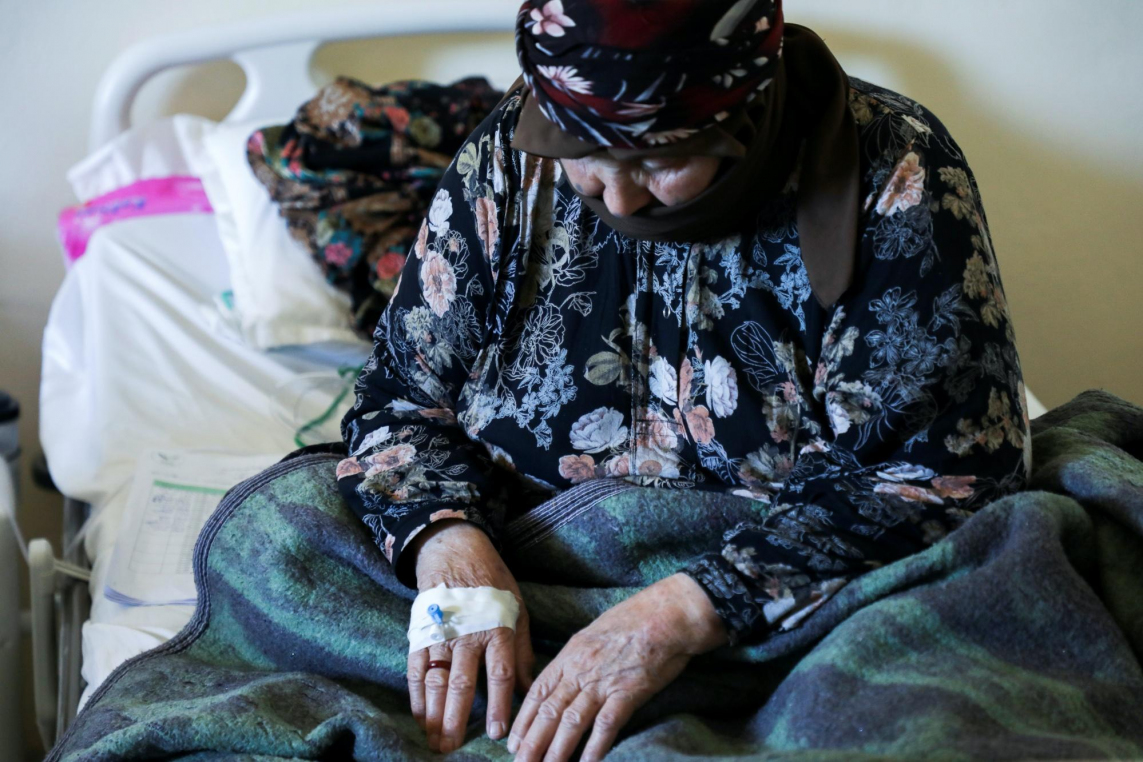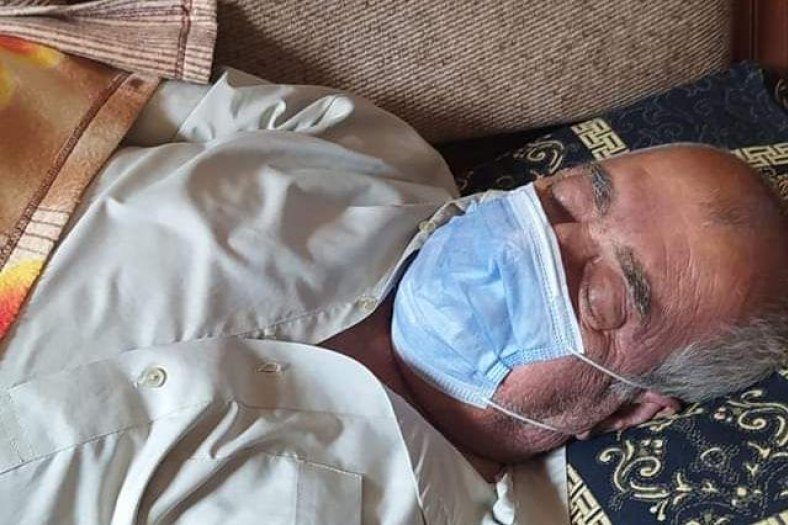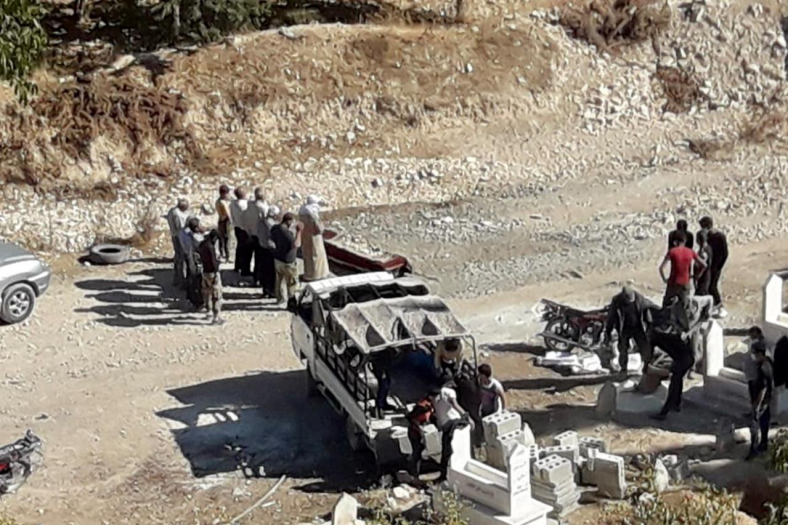Pieter Stockmans volgt het mondiale optreden van de Europese Unie, het Europese vluchtelingenbeleid, de evoluties in Midden-Europa en de regio ten oosten van de EU.
Coronavirus in Northwest Syria: ‘We have survived ten years of war just to die of a virus’

A patient with COVID-19 is treated in an isolation center in Marea, a town controlled by opposition forces in Aleppo province, Syria, September 25, 2021
© Reuters
COVID-19 is leaving a trail of destruction throughout Northwest Syria. The region, which has experienced the evils of war in recent years, is an easy prey for the virus. Refugees in Belgium are losing one loved one after the other. MO* spoke to doctors and family members of victims.
Uncles, aunts, brothers, sisters and grandfather, everyone is sitting around the table in the living room of the Jafar family in Leuven. They are frantically scrolling through Facebook pages on smartphones showing obituaries from their home town in Afrin, a small town in the far northwest of Syria. The page Wafiyat Afrin – ‘Afrin obituaries’ – published 52 obituaries in September. In previous months, there were usually about twenty.
‘Every day we open Facebook to see that yet another person has died.’
‘Today (October 6, 2021, ed.) another four of our acquaintances have died of the coronavirus’, says Delvan Jafar while scrolling. ‘One man in a military hospital, the other three simply at home. Two people from the same family. Every day we open Facebook to see that another person has died.’
Over the past few weeks and months, Delvan has lost his mother-in-law, a close friend, several of his former neighbours, and the father of his brother-in-law Niyazi.
Niyazi has been living in Liège for more than ten years. With a trembling voice and a cup of tea in his hand, he explains how he experienced the last days of his father Ahmed in Afrin from Liège: ‘My dad had no major health problems, but then suddenly he became ill. At first we thought it was just an ordinary flu. We did not dare to think that it could be the virus. He had a COVID-19 test taken: positive.’

Niyazi’s father died of COVID-19 in his home in Afrin on September 16, 2021. He was not cared for in a hospital.
(via Roni Hossein)
Distrust of hospitals in Afrin
‘I called him every day,’ Niyazi continues. ‘After a few days he had sudden shortness of breath. In the end, he could barely speak. He was afraid to go to the hospital. Afrin is occupied by religious extremists who are adamantly opposed to us Kurds. There are rumours that the Turkish Armed Forces or jihadists are involved in organ trafficking.’
Many inhabitants think that they would be putting their fate and life in the hands of Turkey and jihadists, and they don’t dare to do so.
The mistrust towards vaccines, which also exists among a group of people in the West, is magnified in the context of a foreign occupation in Afrin. Conspiracy theories about organ trafficking and vaccinations are rampant on the Internet. Inhabitants think that they would be putting their fate and life in the hands of Turkey and jihadists, and they don’t dare to do so.
The night before his father died, Niyazi spoke to him for a long time. ‘He asked me to get my brother for a video call. I think that he knew that he was going to die because he bid us farewell. The next morning, September 16, he was dead. He never went to a hospital.’
Three days later, family members and friends from the Netherlands, Germany and Belgium gathered in a meeting hall in a working-class area of Liège to offer a final salute, according to tradition, in front of a photograph of the deceased Ahmed.
Long-standing traditions
Ahmed was buried in Afrin. As tradition requires, a large gathering of family and friends is organised at each death. This time, however, Batal, the uncle of the deceased Ahmed, wanted none of it. ‘The many funerals ensure a further spread of the virus, and it just keeps on going,’ he says on the phone from Afrin.
‘They blamed me for wanting to ignore to our long-standing traditions. Even when people know that they can die themselves, some say that there should be a funeral service either way. I don’t understand that. It is just too dangerous now. Ahmed’s wife and daughter are also infected with the virus, by the way.’
‘People have only recently begun to realise that a major pandemic is happening, now that they see that so many people are dying’, continues Batal. ‘For a long time they have denied everything. Even doctors. A few weeks ago I spoke to a friend of mine, who is a doctor. He himself was sick and possibly infected with the virus, but just went to the market, amid all the other people. ‘Do you believe that, covid?’, he asked.’

A funeral of a deceased COVID-19 patient in Afrin, northwestern Syria, September 2021
(via Roni Hossein)
No measures against the coronavirus
The reason why understanding came so slowly is because no government organises campaigns to raise awareness. No government issues and enforces measures against the pandemic. ‘The jihadists who control our region claim that the virus is God’s will,’ says Batal. ‘Then what do you expect? Or when trucks bring relief supplies, thousands of people are packed together without a mask and the virus spreads.’
The fact that people continue to go outside despite the rapid spread of a potentially deadly virus is not only due to cultural customs or negligence.
There is no government that provides economic support for people who stay home from work.
‘My friend Shekho got COVID-19 in Afrin,’ says Delvan. ‘I urged him to stay inside, not to go to the clothing store where he works. He became emotional. ‘Then how am I supposed to get the money to feed my children? I know that this way, other people get infected too, but tell me what else should I do?’ he said.’
The war has caused the economy to collapse and the cost of living has skyrocketed. Every lira earned counts to survive. There is no government that provides economic support for people who stay home from work.
Thus, this new wave of COVID-19 presents inhabitants with an impossible dilemma: to stay at home and not be able to buy food, or to go outside and perhaps get infected with a potentially deadly virus in a region that lacks proper health care.
It is yet another dilemma created by a war that has been destroying the fabric of society for a decade. The same dilemma as having to choose between the risk of drowning on a dinghy in the Mediterranean or dying in a bomb attack in the homeland.
Deadly cocktail
‘Over the past two weeks, more than 16,000 people have been infected with the coronavirus in Northwest Syria and more than 300 people have died,’ says Francisco Otero y Villar, head of mission of Doctors Without Borders.
In reality, the number is much higher. The number of positive tests out of the total number of tests taken is more than 50 percent. That is the number of positive cases for every 100 tests taken, but very few tests are taken due to limited testing capacity. ‘If half of those tests is already positive, then that indicates a huge number of infections’, says Otero y Villar.
About four million people live in Northwest Syria. Relatively speaking, the number of infections is almost as high as it was during the highest peak of the pandemic in Belgium in October and November 2020.
‘Oxygen supplies are critically low and hospitals are overwhelmed, while only two percent of the population has been vaccinated. The health sector had already been hit hard by bombings. Infrastructure has been destroyed, doctors and nurses have fled or have been killed. There is not even enough staff for temporary health centres. That is becoming really problematic now.’

If aid is not increased quickly, the number of deaths will almost certainly continue to rise sharply in the coming weeks, according to Khaled Alkadi, director of aid organization Violet Organisation, which coordinates the aid from the Turkish border city Antakya.
Alkadi is a member of the official COVID-19 Task Force, which also includes the World Health Organisation. This task force makes needs assessments in the field and sends these to major international donors, such as the United Nations, the United States, the United Kingdom and the European Union.
‘Everyone was aware of the impending emergency, yet there was no response strategy for a new outbreak’, says Alkadi. ‘The capacity of our oxygen and ventilators is only enough for half of the patients. Funding was cut back so that only 15 of the 34 community centres for COVID-19 patients are still operating.’
Add to this cocktail: the locals’ deep distrust of hospitals in Afrin since Turkey and jihadists control the region; the collapsed economy and the lack of government support for temporary unemployment that prevents people from staying at home; and the general feeling of despondency after a decade of war, resulting in little enthusiasm to follow measures against the virus.
Hospitals overwhelmed
Even with a prevalent distrust of hospitals, there are still insufficient beds and respirators to take care of all COVID-19 patients, says Sarbas, who lost his mother to COVID-19 on September 22nd. She passed away in Afrin, while Sarbas himself has been living as a refugee in the Turkish capital of Istanbul for years.
Delvan, who worked as a taxi driver along with Sarbas’ brother-in-law in Afrin, gives Sarbas a call from Leuven.
‘All of a sudden mom had difficulty breathing,’ says Sarbas. ‘They tried to take her to a private hospital, but she was not admitted there. All beds were already occupied. They put you on a waiting list because there are not enough beds with respirators.’
‘Those private hospitals are too expensive anyway, and my parents don’t even have money to buy food. So they took her to a military hospital. There she died four days later. She was 62 years old.’
Sarbas sends a video of his mother in bed, breathing heavily. The images are shocking. ‘That was two days ago, see the way she’s breathing? Today she is dead,’ says Delvan. On Sunday, the 3rd of October, he had to attend yet another funeral meeting. This time in Aachen, where Sarbas’ sister lives as a refugee.
‘They put you on a waiting list, because there are not enough beds with respirators.’
‘Oh well, anyone who goes to the hospital with the coronavirus dies anyway,’ Sarbas says on the phone. ‘The past few weeks many people have died in the hospital. Yesterday three acquaintances of mine died in Afrin. Today even a young man of thirty lost his life. I have to find a smuggler to get my family to Turkey. People want to flee from COVID and the war, from everything. I have no words for it.’
There is chaos in the hospitals. Some people who need to be treated for other reasons are refused admission because all the beds are occupied by COVID-19 patients. The few uninfected people who do get admitted, then get infected with the coronavirus at the hospital itself.
Infected at the hospital
Delvan’s wife, Rokan Abdo, lost her mother Fatima Abdo on July 1st. ‘My mother, who had breast cancer, did not die of cancer, but of the coronavirus,’ she says in her home in Leuven. ‘I believe she got infected at the hospital, where she went for chemotherapy. She didn’t come into contact with anyone else because she was at home in bed all the time.’
On the doctor’s note, which the family in Leuven had to present to the OCMW (Public Centre for Social Welfare in Belgium) in order to obtain bereavement leave, the cause of death was written down as: ‘Mrs Abdo, 67 years old, died of cardiac failure caused by COVID-19.’
Fatima had been suffering from breast cancer for two years already. Her survival hung in the balance for quite some time because of the war and the Turkish bombing, which prevented her from getting to a hospital for treatment.
Rokan had just undergone a difficult treatment for breast cancer in Leuven herself and knew that proper treatment could save lives. But from a distance, she had to endure a terrible feeling of powerlessness. Her mother became totally weakened, with the coronavirus dealing the final blow.
Delvan’s cousin, Roni Hossein, has been living in Leuven for more than ten years. He is on the phone with his aunt in Afrin: ‘In our apartment building almost everyone got infected,’ his aunt says. ‘There has already been one death, a man from the first floor. We know so many people who have died, even from the small villages. Yesterday a man died in our village in the countryside, he was 50 years old.’

Health workers carry a COVID-19 patient inside a COVID-19 treatment center at a hospital in Jarablus, northern Syria
(via Roni Hossein)
Despondency in Idlib
Ahmad Al-Hassan works in one of the community centres for COVID-19 patients in Idlib, a city that was badly hit by Russian bombing. He works in collaboration with Doctors Without Borders.
‘Every morning we go over the statistics,’ Ahmad says. ‘The past few weeks we have seen an enormous increase in infections, hospitalizations and deaths. About a thousand people a day get infected. Those are the official figures, but you can easily multiply that by ten because we don’t have enough tests.’
At the moment, Ahmad maintains contact with a hundred infected people via WhatsApp. They were given a device that measures how much oxygen they need. Through these means, Ahmad knows when they are in need of a respirator.
‘If your life hasn’t had any value for over ten years, why then should you follow measures?’
‘They can get one to use at home if there is no room at the hospital,’ says Ahmad. ‘If their situation gets worse, they have to be admitted, but there simply is no room. At the moment there are thirty people on the waiting list. We have 170 ventilators, which is far too little. I know many people who have died at home.’
When someone dies, Ahmad not only has to contact the family, he also has to deliver the message that only a limited number of family members are allowed to be present at the funeral.
Idlib is the last stronghold still controlled by militias opposing President Bashar al-Assad. The UN considers the largest of these militias, which grew out of al-Qaeda, to be a terrorist organization. This military organization also set up a civil administration
‘Last week, for example, they decided to close restaurants’, says Ahmad. ‘But hardly anyone follows those rules. People had already given up on life after ten years of war and having lost so many loved ones. If life has no value anymore, why should you follow any measures? What I often hear is that exposure to the coronavirus is a welcome suicide.’
China and Russia help Aleppo
Khalil Horo, an old acquaintance of Roni Hossein from Leuven, works in a health centre of the Assad regime in Aleppo where he administers COVID-19 tests. He testifies about the situation in the city.
‘We are experiencing an unimaginable peak in infections. People get symptoms, and their death often follows shortly after. Today, a man in his fifties died in an ambulance.’
In Aleppo, there are strict and coercive measures. If someone is seriously ill, he or she has to go into a closed quarantine centre outside the city. There, the government collaborates with the Red Cross, in all government buildings you find disinfectant gel and everybody has to wear a face mask.
‘China offers medical aid to the Assad regime in Aleppo. But if my relatives in Afrin, 60 kilometers from here, get infected, they are doomed.’
‘And yet there are many infections, because of the broken economy. If we stay home from work to prevent infections, we do not get paid by our employer. We have to work to ensure our survival.’
‘One euro is now worth 3900 Syrian Lire. A monthly wage is 80,000 Lire (20 euros). Take bread for example. One bread costs 1500 Lire (half a euro). If you have to buy bread for an entire family, you spend half a month’s salary on that alone.’
Khalil’s parents and brothers live in Afrin, just sixty kilometers away. He has not seen them since 2016 and any movement or travel is near impossible, except through extremely expensive smugglers.
‘Afrin is a prison because they cannot go to Turkey either. They are trapped like rats. No government administration cares about them. Here in Aleppo, China helps the Syrian government with respirators for the hospitals. If my relatives in Afrin get infected, I cannot save them. Anyone who gets infected in Afrin now is doomed.’
This article was written with the help of Tine Danckaers, Roni Hossein and Delvan Jafar.
Translated by Robbe Ghijsels, Annelies Jossa and Sarah Tobback (Virtual Translation Agency KULeuven).

Maak MO* mee mogelijk.
Word proMO* net als 2798 andere lezers en maak MO* mee mogelijk. Zo blijven al onze verhalen gratis online beschikbaar voor iédereen.
Meer verhalen
-
Report
-
Report
-
Report
-
Interview
-
Analysis
-
Report










 Oxfam België
Oxfam België Handicap International
Handicap International